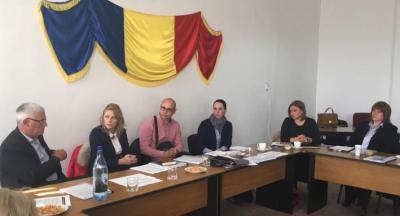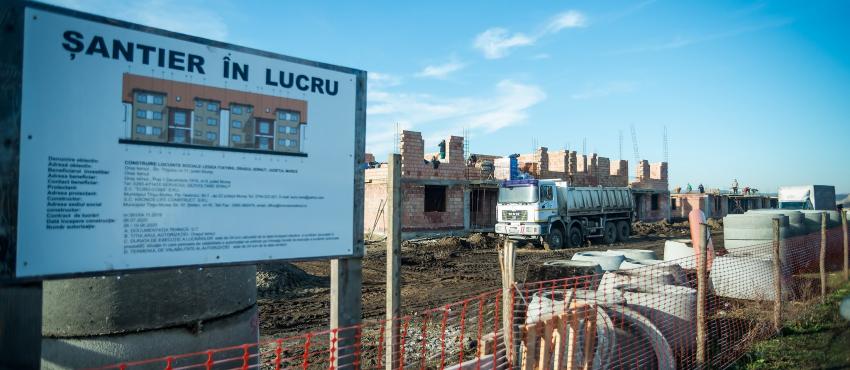Iernut
*Disclaimer: The information and views set out in this page do not necessarily reflect the official opinion of the Council of Europe and/or the European Commission. Neither the Council of Europe, the European Commission nor any person acting on their behalf may be held responsible for the use which may be made of the information contained therein.
Iernut city is situated in Mures County, 30 km Targu Mureș (the residence city). The city is crossed by Mures River, providing conditions for water supply and water energy. Iernut city hall manages 6 villages: Cipau, Deag, Lechinta, Oarba de Mures, Salcud and Sfantu Gheorghe. The ethnic structure of the population is: 6.347 Romanian, 1.112 Hungarians, 846 Roma and 400 other ethnicities. Only 57% of the population has access to water supplying services, and only 45% to sewage system. The health infrastructure is not better – there are only 8 doctors in the municipality, 4 dentists, 5 pharmacists and there is no hospital in the municipality, only 1 private clinic.
There are 2 compact Roma communities: Cipau and Horea. Infrastructure is very poor in Cipau community – no/little connection to utilities, no asphalted road. Health infrastructure is also not very good, there are no medical facilities on a radius of 5 km from Roma community. There are 186 Roma children aged 3 to 15 and only 80 of them are going to school (they have to take care of their younger siblings as parents are often away for occasional works). 150 families benefit from social support. The medium size of a Roma family is 6 in Cipau community, respectively 4 members in Horea. 48 households are at immediate eviction risk because the inhabitants illegally built homes on private properties and there are court decisions for eviction.
The ROMACT Process
ROMACT process started on June 2017 with the signature of the Letter of Agreement. The Joint Action Plan (JAP) was approved on 27 November 2017. The Community Action Group (CAG) identified some of the short/medium/long-term needs and the solutions:
| Priorities | Objective 1 | Objective 2 | Objective 3 |
|---|---|---|---|
| Education | Setting up two professors positions to support the Roma community | Offer scholarships for 20 Roma students | Develop Second chance and School after school programs |
| Health | Setting up and ensure the functioning of a social bath | Establishing a medical center to serve the entire Roma community | Vaccination and tuberculosis campaigns, HIV / AIDS and BTS (Sexually Transmitted Diseases), healthy eating and home hygiene campaigns |
| Infrastructure | Bringing drinking water, sewerage and public lightning in the community | Roads rehabilitation in the community | Setting up a day care center to prevent school dropout |
| Culture | Funding events to promote Roma traditions, customs, songs and games in the framework of Iernut City Days. | Financing events with Roma specific | |
| Housing | Construction of 40 social housing | Rehabilitation and extension of housing in Roma neighborhoods | Setting up a leisure complex for children |
| Other | Hire one local police for the areas inhabited by Roma people | Financing sanitation and domestic waste collection in Roma communities | Acquisition of 20 organic toilets to be located in Roma communities |
The Municipality benefited of ROMACT expertise for the following projects :
The expertise provided by ROMACT for municipalities involves training and guidance on preparing project proposals and implementing inclusive policies aimed at improving the living conditions and social integration of vulnerable populations, including the Roma.
* Improving the quality of life for population from Iernut- ROP 13.1.
Budget: 5 017 407€
Status : approved
* Building social blocks under 114/1996 Law framework in Iernut (3 social blocks with 36 apartments) - Ministry of Regional Development.
Budget: 2 488 461€
Status : approved
Trainings provided by ROMACT experts :
Community Action Groups:
* Community development and civic participation
Local Authorities :
* Elaboration of the JAP
* Working methodology on collaboration between General Directorates for Social Assistance and Child Protection Social Services
* Writing a competitive proposal for ROP, PA 13.1
* Project management vocational training
* Public procurement expert vocational training
The following measures to solve problems in Roma community were taken :
* Renovation of street infrastructure (street lighting)
* Ensuring hot meal for vulnerable students;
* School after school for vulnerable students
* Replacing the fines given by the police by community service
* Heating aids
* Collective cleaning activity in Cipau neighborhood
* Set up of 20 ecological toilets
* Celebration of International Roma Day
ROMACT Small Grants Scheme :
ROMACT offers small grants scheme to support the efforts of the municipalities and Community Action Groups to respond together to the needs of the most vulnerable and to multiply the good practices across ROMACT municipalities.
Under the scheme of small grants, the following projects were supported by ROMACT between April – December 2020:
We care! - Iernut Municipality
ROMACT supported the municipality with 3534 € and reached 600 vulnerable citizens during the first peak of pandemic. The project covered information campaign on COVID19 and provided masks, disinfectant products, informative flyers for the vulnerable families in the community. Telephone consultancy and specialized assistance were also offered to people who are at high risk of health due to COVID19.
Integrated support system for vulnerable students – Iernut Gymnasium School
ROMACT supported the school with 4420 €, reaching 298 students. The project increased the pupils’ school attendance with higher level of self-esteem in a proper sanitary environment through the procurement of school supplies, compact air disinfection system, hygiene products, proper clothing for sport activities for each pupil. Pupils and their families received counselling sessions on integrated measures against the pandemic and the importance of education in order to reduce school drop-outs during the pandemic.



